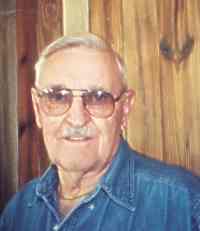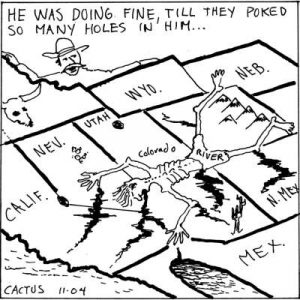Essay by John Clayton
Modern Life – November 2004 – Colorado Central Magazine
THE BIG NEWS in my small town has been the new automated checkout line at the grocery store. You scan the purchases yourself, and then give the machine your credit card, with no need for any human interaction. At least that’s how I’m told it works — I haven’t used the thing myself.
It’s a big change for a town like ours, where some people still write checks for everything. Take my friend Chuck: When he buys coffee in the morning, he writes a $3 check. When he buys two beers of an evening, he writes a $10 check.
Chuck’s checks are an institution in town. Last November, the bookkeeper for the restaurant where Chuck buys his coffee became worried when those checks stopped coming across her desk. Was he upset at them for some reason? Then one morning she saw him in there buying coffee — it turned out he hadn’t missed a day, but had been paying in cash!
Why does Chuck so love checks? I’ve never asked him — it seems sort of personal, plus I have more fun speculating. I’m suspecting it’s a subtle form of advertising: recently a friend was wondering how to describe Chuck’s business, which involves furniture.
“He does ‘custom woodworking,'” I responded. “At least that’s what it says on his checks.”
Perhaps Chuck writes checks merely because he can. It’s a small town. Everyone knows him. And writing lots and lots of checks is an ancient small-town tradition, one that is not dying quickly. I lived in the city in the 1980s, when already checks were becoming outmoded. But when I moved to a small town in 1990, we had no automated teller machine, so you couldn’t get cash when the bank was closed. On a weekend, especially, you wrote a check and got change in cash.
Here’s the funny thing, though: Chuck, who’s just over 30, is too young to remember those days. The ATM has always been part of his world. He just prefers a world where he writes checks.
For 10 years I’ve been passing an automated-teller in the bank’s lobby, on my way to cash a check with Sharon or Roxy or Lola. I’ll say good morning, chat about the weather, pick up a piece of candy from the basket by the teller window.
But in the past few months I have started using the ATM. Sharon and Roxy and Lola have left the bank, and so the new tellers are strangers. What fun is that? (I do still like to go in and grab a piece of candy before heading back to the lobby to perform my humdrum interaction with a machine.)
Presumably the same principle is at work at the grocery store. I hardly ever see anyone using the automated grocery checkout, and when I do I rarely recognize anyone. Out-of-towners have never met Evie, and so feel no need to say hello to her rather than handing a card to a machine.
OCCASIONALLY I SEE the store’s employees at the auto-line. Maybe they get to say hello to each other during their shifts. Or maybe they’re just there to help. On a recent trip I passed up the vacant auto-line to wait in a longer line for a live check-out clerk. And while I was waiting, an employee was paged to customer service. This used to mean that somebody was needed to help a customer carry bags to the car. But now, the responding employees look first to the auto-line. Another customer needing rescue after being stymied by technology. More job security for Evie.
I suppose, eventually, most of us will come to accept the automated machines, as we’ve accepted ATMs and even online banking. But we’ll probably do so a lot more slowly than people in urban areas. We’re a little more people-oriented, a little more opposed to what some might call progress.
Last spring, a local variety show featured a running gag about the automated grocery checkout. But the jokes, which involved the disembodied voice of the machine issuing bizarre instructions, didn’t work too well. Nobody in the audience had used the machine enough to understand them.
John Clayton is a contributor to Writers on the Range, a service of High Country News (www.hcn.org). He writes in Red Lodge, Montanaa



